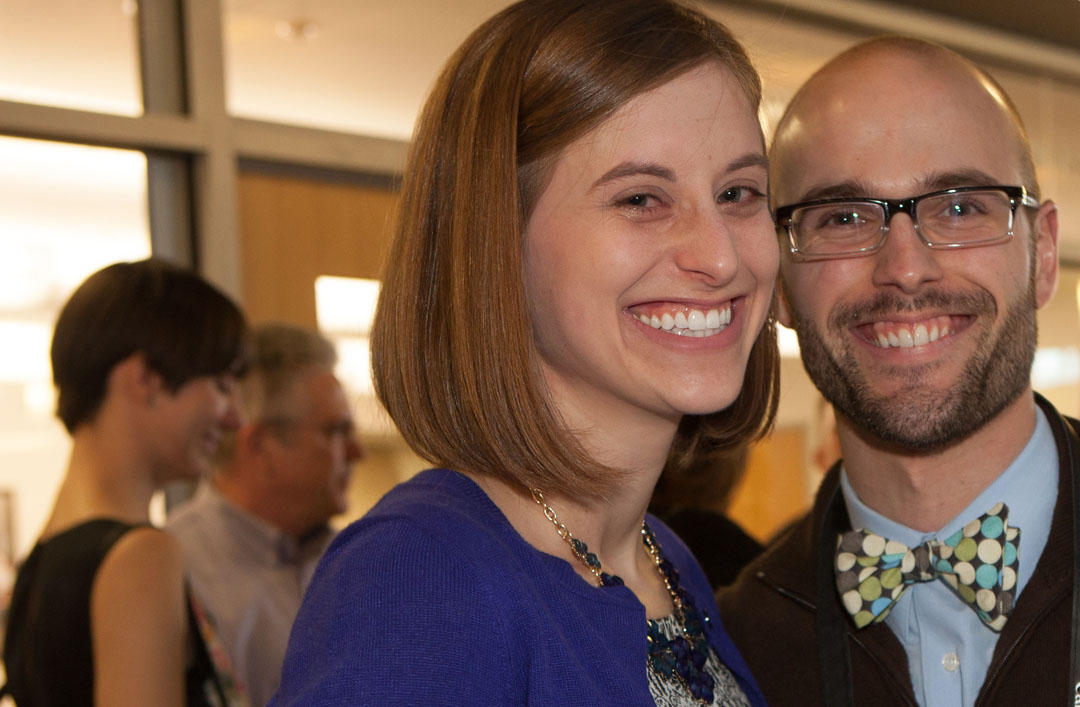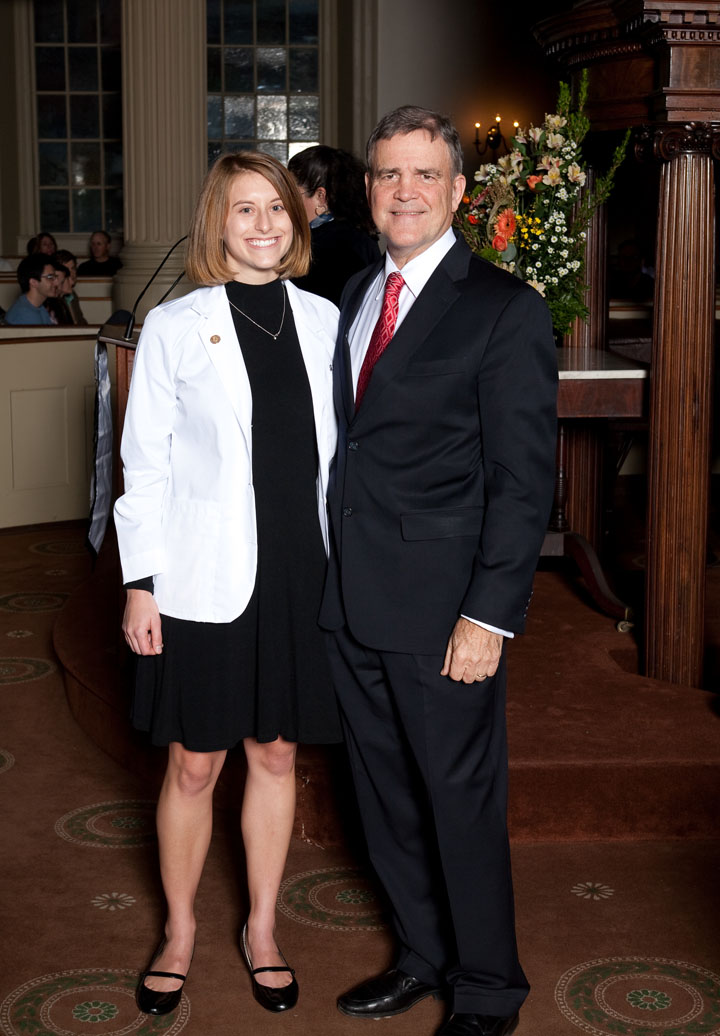Because she had already begun to fight the good fight there as student, graduating medical student Jessica Heney will begin her family medicine residency at Memorial Hospital next month with a mission already underway: to advance adolescent health care at Central Falls High School.
The poverty rate among children living in Central Falls is 40 percent. Some aspiring student athletes never join the school’s teams simply because they can’t afford the required physical. But what particularly struck Heney in her third year as a student in the Warren Alpert Medical School was that 1 in 10 female Central Falls High School students becomes pregnant (the highest rate in the state).

The evening class they taught consisted of nine students aged 14 to 18. Half the girls were carrying their first child but one teen was already a mother of two.
Now, because Heney successfully matched at the Family Medicine Residency Program at Memorial, she can continue to work at the hospital’s Family Care Center and at CFHS. She’s especially inspired by an idea under discussion between the school and Memorial to revive a school-based health center there that had once existed but was forced to close when grant funding dried up. She’s working with Drs. Susanna Magee and Jordan White on the effort.
“That will be a colossal residency project,” she said, “but it’s our goal to have a fully functioning clinic there by the end of my residency.”
A first step, she said, would be to provide physicals to those aspiring athletes. Ultimately a clinic could become an adolescent medicine residency training site for Memorial.
“It’s in the works,” she said.
Roots of empathy
Although Heney won’t officially become a doctor until Commencement on May 26, she advocated for disadvantaged populations well before she started medical school. Her determination is simple and compelling.
“I firmly believe in equality,” she said. “It’s really important to me that I try to work to help alleviate inequity.”
The first step in acquiring this motivation, something she had accomplished by high school, was to recognize the disparities around her.
Heney lived an idyllic childhood in Southborough, Mass., a suburb 25 miles west of Boston.
“I grew up in a community surrounded by my loving family,” she said. “Down the street from where I grew up there was a beautiful farm that my family owned for four generations. We grew up running down the street to go swimming in the pool and to play with the animals.”
Childhood gave way to a more mature perspective.
“Toward the end of high school when I started to expand my thinking, I realized that a lot of people don’t have that same opportunity to just be a kid.”
By the time she enrolled as an undergraduate at Boston College, she knew her path. She majored in biology and minored in faith, peace, and justice, a curriculum that she used to delve deeply into the study of human rights. She also volunteered at Brigham and Women’s Hospital for the famed humanitarian nongovernmental organization Partners In Health. From Boston she assisted staff members as they worked on a project to provide alcohol and addiction care for patients with tuberculosis in Siberia.

“She gave me a big hug, and I remember leaving that day just so happy in the car thinking that even if 10 percent of the people at Brown are like this, then this is where I want to be,” Heney said.
Brown also fulfilled its promise as a place to embrace the cause of rooting out health disparities. In January of her first year, Heney volunteered to help carry on an emerging project. Brown medical students had begun to train refugees to be interpreters for newer refugee populations and to function as community health supporters in order to help acclimate the newcomers to the health care landscape in their new homes in Rhode Island. That’s also where she began to work with her friend Dimock.
The students met refugees from a wide variety of lands: Somalia, Eritrea, Nepal, and more recently Iraq.
“That was one of the best parts of this project,” she said. “I loved hearing all of their remarkable stories.”
The effort was educational in a pragmatic way as well. To support their work, Heney and Dimock applied for and won a Peterson Fund Grant from the University (they have since won other small grants for other activities including the CFHS pregnancy group). For physicians given to community advocacy as well as research, grant money often provides the lifeblood for these projects. Even free health care, after all, is not really free.
Standout student
Although medical students are notoriously short on free time, Heney also helped to lead the school’s Family Medicine Interest Group (FMIG). It’s no coincidence, according to her Dean’s Letter recommending her for residency, that the group was named a National Program of Excellence during her tenure in 2010 and 2011.
Despite taking on the causes of teen moms and refugees, as well as the FMIG, Heney still found time to excel in the classroom. Her efforts earned her induction into Alpha Omega Alpha, the country’s medical honor society.
And she left a trail of admirers along the way, the letter shows.
Said a second year family medicine resident at Memorial: “She was a joy to work with, she was clearly able to connect with difficult patients immediately, and her interview, physical exam, and presentation skills were far above what I would expect for her level of training.”
Said a surgery preceptor: “She is extremely dedicated to providing the best care for her patients, and that attribute shines through in her readings and interactions with patients.”
Dimock, who will pursue a family medicine residency in Maine after graduation, said of her close friend Heney: “She embodies qualities of compassion and patience, and amid the chaos that presents itself in busy clinics, she takes the time to listen to her patients. Beyond this, she is sharp, focused, and dedicated. She is the type of student and soon-to-be physician that others, including myself, aspire to be. And among all of these great things, she is one of the most humble individuals I know.”
Among her studies and activities, she also had the surgical skills to carve out time on the calendar in July 2012 to marry her Boston College sweetheart, Ryan Heney, who will graduate from the Alpert Medical School in two more years. Given the school’s 3.4-percent acceptance rate, it’s no small feat for both members of a couple to attend.
This spring the couple bought a house in Cumberland. The town happens to share a border with Central Falls on the south.
A doctor and advocate
All physicians care about the welfare of patients, but the long-term connection a primary care physician maintains with patients and their community, Heney said, is what makes that specialty especially well-suited for advocacy and activism.
“The primary care doctor is supposed to know the patient the best and is supposed to be able to step in and help based on all they know about that individual and their life,” she said. “That’s the part of primary care that excites me the most. I love getting to know people and hearing their stories.”
And then she sets out to make their stories a little happier — as they should be for everyone.
